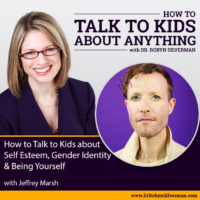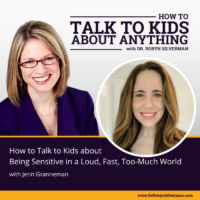Podcast: Play in new window | Download
Subscribe: Apple Podcasts | RSS | More
How to Talk to Kids about Being Self-Driven, Self-Motivated & Self-Controlled

This podcast will focus on the science and sense of giving your kids more control over their lives. What can we do and say to help show our kids that we believe in them, trust them and feel confident about them making key decisions in their lives about what they need and want for themselves. When we take over, we weaken them and say “don’t trust yourself- trust me instead.” When we externally motivate and incentivize, we don’t allow them to look within themselves and find what intrinsically motivates them. If we want our children to be “self-driven,” we need to allow them to make decisions, make mistakes, learn from them and apply their new knowledge to the next set of decisions. In an interview with Dr. William Stixrud, best-selling co-author of The Self-Driven Child, we learn that this sense of control, while feeling supported by key adults, will benefit our children in all areas of their lives.
Special guest: Dr. William Stixrud
Are we raising an anxious generation? Many would agree that we are. The causes of the uptick in anxiety among children has started to be discussed—even within our podcast- we have talked with Jessica Lahey and our obsession with grades and our focus on avoiding failure at all costs. We have talked with Julie Lythcott Haims about the bubble-wrapping of our children that leaves them unprepared for a life that we deliver them to at the age of 18—a life in which they don’t have the skills, yes, but also where they don’t have the resilience or the confidence to take it on. In The Self-Driven Child, authors William Stixrud and Ned Johnson continue this conversation—focusing specifically on the ways that children today are being denied a sense of controlling their own lives—doing what they find meaningful, and succeeding or failing on their own, and on their own terms. While screen time and technology certainly are part of the problem, the real issues lie with us—the parents and the teachers—who have their hearts in the right place but are nevertheless, taking the opportunities away from children that would allow them to grow stronger, more confident, more autonomous, more competent– and more themselves.
to be discussed—even within our podcast- we have talked with Jessica Lahey and our obsession with grades and our focus on avoiding failure at all costs. We have talked with Julie Lythcott Haims about the bubble-wrapping of our children that leaves them unprepared for a life that we deliver them to at the age of 18—a life in which they don’t have the skills, yes, but also where they don’t have the resilience or the confidence to take it on. In The Self-Driven Child, authors William Stixrud and Ned Johnson continue this conversation—focusing specifically on the ways that children today are being denied a sense of controlling their own lives—doing what they find meaningful, and succeeding or failing on their own, and on their own terms. While screen time and technology certainly are part of the problem, the real issues lie with us—the parents and the teachers—who have their hearts in the right place but are nevertheless, taking the opportunities away from children that would allow them to grow stronger, more confident, more autonomous, more competent– and more themselves.
William R. Stixrud, Ph.D., is a clinical neuropsychologist, frequent lecturer, presenter, author and founder of The Stixrud Group. He is a member of the teaching faculty at Children’s National Medical Center and an assistant professor of psychiatry and pediatrics at the George Washington University School of Medicine. Additionally, Dr. Stixrud is the author, with Ned Johnson, of the nationally bestselling book, The Self-Driven Child: The Science and Sense of Giving Your Kids More Control Over Their Lives. You will also see him featured for his expertise in publications such as The New York Times, The Washington Post, The Times of London, The Wall Street Journal, U.S. News and World Report, Time Magazine, Scientific American, Business Week, Barron’s, and, New York Magazine. And—fun fact- Dr. Stixrud also happens to be a musician who plays in a band!
The podcast provides:
- Why kids need to have a sense of control over their lives
- What self-control has to do with stress and why it’s such a big deal for kids
- Some ways that parents, teachers, admin, coaches and other adults who work with kids can get out of their own way and help to foster a healthy sense of control in kids
- Key ways to help kids find their own internal motivation
- General principles for communicating with kids in a way that nurtures a sense of autonomy or agency
- An example of what it SOUNDS like to communicate with kids in a way that nurtures autonomy.
- How a “consultant model” can work both for a parent and a coach or teacher in the life of a child
- What it sounds like to be a consultant in a child’s life rather than an enforcer or a rescuer who is taking over a child’s self-control?
- How this consultant model applies to kids with ADHD or learning disabilities—and what do parents need to know?
- How to talk with kids about mistakes and failure when we are urging them to take a larger role in the decision making in their lives—and what we do/say when they do mess up
Important Messages:
 Stress has profound effects on the brain especially developing brains.
Stress has profound effects on the brain especially developing brains.- Sonya Lupien, Neuroscientist in Montreal, summarizes the 4 things that make life stressful- acronym NUTS: Novelty, Unpredictability, Perceived Threat, Low Sense of Control. Sense of Control- most stressful if “something is happening but there is nothing I can do about it.”
- Dramatic increase of stress in recent years.
- How do kids get self-motivated? Sense of control. Need to find the healthy medium between excessively driven and what’s the point in trying?
- Look at research on sense of control: Live longer, healthier physically, cognitively, mental health, perform better, do better academically.
- Research on rats: turn the wheel- the shock would end. Starting coping in all situations. Prefrontal cortex activated. Deal with fear response. If the rats didn’t have this ability, they became nervous wrecks.
- When people have a sense of control- prefrontal cortex is activated, lower stress, dampen stress response. Optimal brain health. Neurological marker of good mental health- strong connection between prefrontal cortex (think logically, perspective) and amygdala (senses danger). Want kids to have prefrontal cortex and amygdala connection to best regulate stress.
- When you are dealing with stress- good stuff can happen- the prefrontal cortex activates, the stress response becomes dampened, and you go into coping mode. That’s what trains you to be resilient.
- We don’t want to protect kids from all stress.
- Principle: This is NOT your responsibility to ensure that your child does his/her homework.
- Script: (1) I love you too much to fight with you about doing your homework. (2) I’m willing to help you! I’ll be your homework consultant and set my hours from 6- 7:30 and help you every night. (3) I am not willing to chase you around the house, fight about it or make you do it because I don’t want to weaken you. (4) If I act like it’s my job to get your homework done, I will weaken you—because it’s really your job.
- Treat kids respectfully. Be a consultant—you can’t make a child do anything.
- While there is a place for rewards, they can undermine a child’s self motivation.
- Carol Dweck- study of mindset. Growth mindset: “I can get better. I can do this with my own effort. The more I practice, the better I get.” Gives a sense of control. Fixed mindset: “There’s nothing I can do about it- I am born with a certain amount of ability.”
- Self determination theory- powerful theory around self motivation- in order to be self motivated, you have to have autonomy, relatedness and competence. “This is my life.” Respect interests.
- Flow experience: When kids are really engaged in something they really want to do. Reed Larson: Studies adolescent development. How become self motivated? Passionate pursuit of their past times- things they love to do. Video games don’t count. Sports, music, coding, building with legos, gymnastics, dance. High effort, high focus, high determination, low stress. Respect kids’ pastimes. Have time to do it.
- What builds motivation- sense that this is my life. This is what I love to do. Passionate engagement. Sculpt the brain with this flow state.
- Worried about kids? Take long term perspective. Not about the present- it’s about the future- that’s where our worry lies. If a child hasn’t developed his/her passion yet, parent might worry that he’ll never have any passions and will only want to play video games. Most kids don’t stay stuck. You might not see it coming—but their passions will likely be ignited.
- Negotiate good limits on electronic stimulation like video games. It’s hard to have anything more stimulating than that. Video games don’t have the same effect on developing intrinsic motivation as compared to art or sport or music. It’s harder to stop playing than it is to continue playing.
- Parents need to manage their own anxiety- realize when we are catastrophizing- fortune telling (he’s not motivated now, he’ll never be motivated) take a long range view- because often, the problem rights itself. Encourage them to try different things- give them time- they’ll find something they like.
- Stepping stones- even if not passionate about a certain task/job/sport—here’s how it will help me in the future get to the thing I do want to do.
- Difference between “feeling like” doing something and “wanting to” do it. (Daughter woke up as infant- job to go get her and bring her to mother to feed her—didn’t feel like doing it but wanted to do it. Might not feel like going to school, but want to graduate.) “I want to do it but I don’t feel like it.”
- Ask your kids: Is there stuff in your life that you would like to have more control over? Allow them to step up to the plate. Let them know- you have confidence in them- that they can run their lives. You want their buy in. Offer help- but don’t force it. Offer advice. Don’t tell them over and over again.
 Script: “I’ve got some advice about that- would you like to hear it? I’ve got an angle on that- would you like to hear it?”
Script: “I’ve got some advice about that- would you like to hear it? I’ve got an angle on that- would you like to hear it?”- Cartoon: “Listen up boys and listen up good because I’m only going to tell you this a million times.”
- See a lot of kids who think they are stupid. They are like stuck doors. The more you try to pull, the more they hang on to the idea.
- Script: “I’m not going to try to take that away from you. You want to keep that point of view, I’m fine with that. But I have a different view- would you like to hear it?” When do this- wrapped attention- not fighting. Real discussion vs a debate. Listening to each other- not trying to win and counter.
- Principle: Get buy in. Don’t tell them over and over. Send a text- then say “I’m not going to bug you about it. Can I ask you about it in two months?”
- Kids as decision makers. Even young kids can make decisions about their own lives. Require teenagers to make decisions about their own lives. You become a good decision-maker, in part, by making decisions and learning from your mistakes. Important message to send to our tens- that you have confidence in their ability to make their own decisions about their lives.
- Script: With younger kids- “You are the expert in you. Nobody knows you better than yourself. You know when you are hungry, you know when you’re not hungry, you know when you are hot or cold, you know what you want, you know what’s important to you.” So- go with the child’s decision unless it’s crazy. Set limits.
- Opposite of a sense of control: Helpless, hopeless, passive, resigned, overwhelmed, anxious.
- Make rules- making lunch- brownie, sure, but a small part of your lunch- not whole lunch.
- Kids need to make informed decisions- know more.
- Emotions drive good decisions. Not necessarily rational. Emotions rooted in “what do I want?”
- “It’s going to be your call” Kids will think it through and ask opinions.
- Dressing self- might not look great- but gaining confidence.
- Coach vs parent- kid is choosing to have the relationship with the coach- so listen to the coach. Child who doesn’t practice- if you use force- doesn’t work.
- Script: Communication techniques. “Obviously, I can’t make you do this.” “You are acting like I can make you do this. All you’d have to do is flop to the floor and close your eyes.” Describe all the ways they can beat you- beat the system- I personally think the best thing working with stubborn, oppositional kids is; “I am not going to try to use the force of my will to make you do this.”
- Negotiate- Script: “I can see, if you work hard, you can have this potential. You can be really good. Would you like to be better at that than you are? Is there a way that I can help you get down to business and work harder?” Seek buy in. Offer help. See confidence and potential. As opposed to telling the kid the same thing over and over. Not force of will. Talk to them and offer help.
- Child explains problem- and tell her/him what to do- argument. Instead- is there a way I can help? Opens door.
- Neurologically makes sense. When force kid- humans don’t like to be forced- amydala senses threat. Activates. Starts fighting. If they go to the fight part- they won’t hear a thing.
- Story: A 7-year-old girl vs 19-year-old boy with ADHD- 7 year old doing homework before playing. And 19- year- old flunking, not going to class. She had a sense “this is my work.” Older child- feeling like it’s someone else’s problem. Incentives are ok- but don’t work harder to sole the kids’ problems than the kids!
- A lot of kids with ADHD want to get their work done. Don’t force. Is there something I can do to help? It’s a motivational disorder. Low dopamine levels. Medicine jacks up dopamine. “I know that your brain does not have enough dopamine to focus on this boring stuff. If you want to get this stuff done, I am willing to offer you an incentive to do it- to see if it will jack up your dopamine.” Healthy way to do rewards instead of here’s what you have to do and here’s the reward schedule. That undermines autonomy. Happy to help kids with ADHD with dopamine levels as long as it’s in service of their own goals.
- Needs to be: This is my work, this is what I want to do, and I’ll ask for help when I need it. BUT- don’t work harder than they do. You’ll weaken them that way. I don’t want to weaken you- so, how can I help?
- More of a sense of control means a greater likelihood of making mistakes.
- Mess up- if we don’t react in a big way, this is helpful.
- We are not saying that the kids are on their own.
- “Would it help you if…” “Do you want me to bug you about…”
- Story: Why didn’t you hand this in? “Because you didn’t remind me.” This can’t be that the parents manage their kids. Not completely independent though.
- Kids should be able to run their own lives for at least 6 months before they go off to college. Appointments. Food. Dressed. Making decisions. Learning from mistakes. “I want you to practice running your own life. I want you to make decisions. I want you to make mistakes. I want you to learn from them.” Wisdom comes from bad decisions.
- “I hope you find things that you suck at. Successful people are good at some things, and suck at others—and they don’t try to make a living in something that they suck at.” Channel the message that successful people DO make mistakes. I want you to make mistakes—and learn from them.
- Non-reactive parent- start with empathy instead of our own anxiety or anger.
- Infants: respond to warmth and responsiveness.
- Book in 80s. How to Deal with your Acting Up Teenagers. Apply to kids with ADHD? It’s just about treating kids with respectfully. Support them. Adopt consultant role- believe in them and let them trust themselves- this is top tip.
- Story: Is there something that your parents could have done that would have been helpful? “They could have been happy to see me sometimes.”
- Kids- joy-producing organism. Smile at them. Builds relatedness.
Notable Quotables:
- “We need to help kids gain a healthy sense of self-motivation in between the extremes of ‘excessively driven’ and ‘what’s
 the point in trying?’”
the point in trying?’” - “When you have a sense of control, the brain works optimally. You live longer, you are healthier physically and mentally, you perform better and do better academically.”
- “The way kids become resilient is—something stressful happens—and they deal with it.”
- “The way we become resilient is that when something stressful happens, your brain engages and copes, ideally with some support. But we don’t want to bubble wrap kids or take responsibility for something that is their’s.”
- “You can’t make a kid do something against their will and it doesn’t make sense to fight with a kid about the same thing over and over again.”
- “I love you too much to fight with you about doing your homework.”
- “Treat kids respectfully: Kids have a brain in their heads and they want their lives to work.”
- “When we are worried about our kids, we need to take a long-term perspective. All of our anxiety about our kids is not about the present, but about the future. Most kids don’t stay stuck. Don’t panic.”
- “Negotiate good limits on electronic stimulation like video games because it’s hard to have anything more stimulating than that. Video games don’t have the same effect on developing intrinsic motivation as art or sport or music because it’s harder to stop playing than it is to continue playing.”
- “Have a real discussion instead of a debate. Listen to each other instead of trying to win and counter.”
- “Require teenagers to make decisions about their own lives. You become a good decision-maker, in part, by making decisions and learning from your mistakes.”
- “The best message you can give to a teenager, besides ‘I’m crazy about you,’ is ‘I have confidence in your ability to make decisions about your own life and learn from your mistakes.’
- “Go with the kid’s decision unless it’s crazy.”
- “I don’t want to work harder to help a kid solve his problems than the kid does. I don’t want to take responsibility for something that is the kid’s responsibility.”
- “If my kid is anxious, one of the best ways that I can help them is to manage my anxiety better.”
- “Infants respond to warmth and responsiveness. I’m not sure if there isn’t a time in our lives that empathy doesn’t help us.”
- “When our kids aren’t doing well, sometimes we think we can’t enjoy them because we don’t want to send the message that it’s okay to keep screwing up. From my point of view, one of the best things we can do for kids is to simply enjoy being with them.”
Require teenagers to make decisions about their own lives. You become a good decision-maker, in part, by making decisions and learning from your mistakes, says Bill Stixrud of @SelfdrivenChild on #talktokids podcast
Click To Tweet
Resources:
Social Media for Dr. Robyn:
- facebook.com/DrRobynSilverman
- twitter.com/DrRobyn
- instagram.com/DrRobynSilverman
- facebook.com/HowToTalkToKidsaboutAnything
The post How to Talk to Kids about Being Self-Driven, Self-Motivated & Self-Controlled with Dr. William Stixrud – ReRelease appeared first on drrobynsilverman.com.







